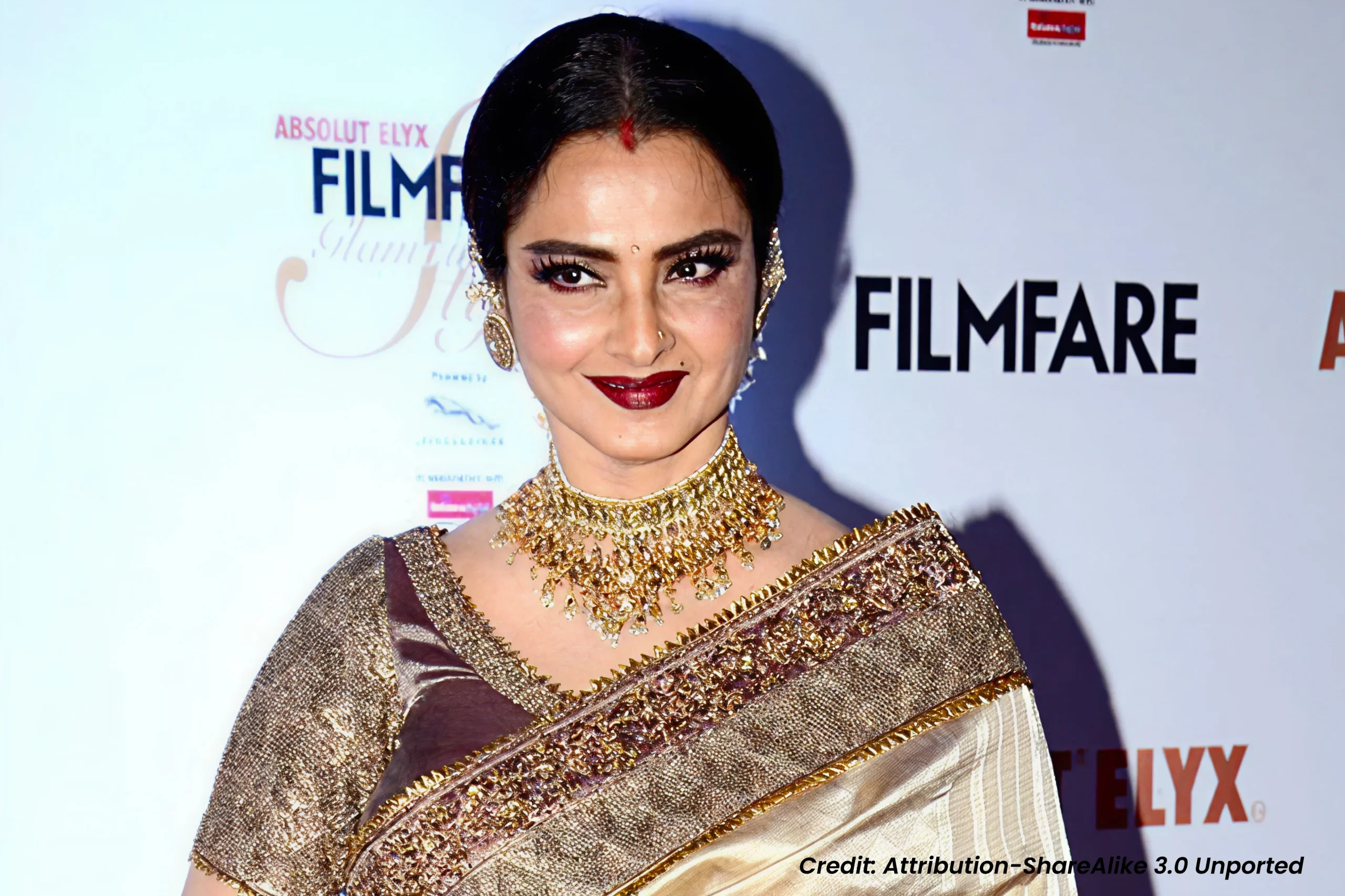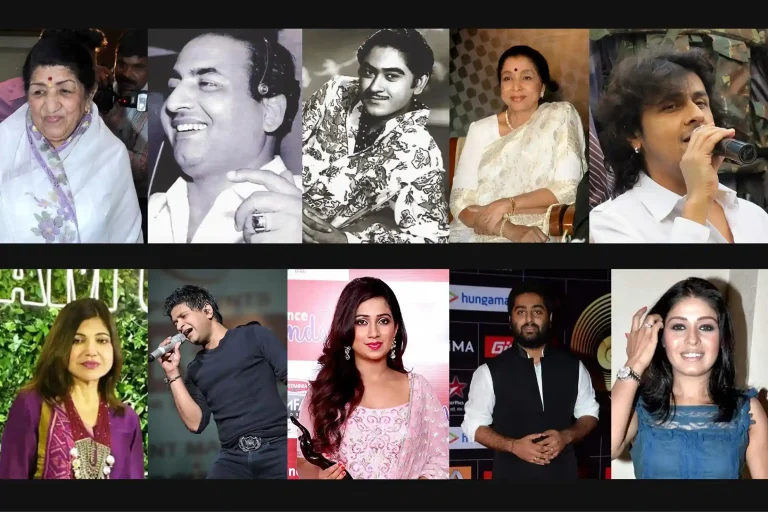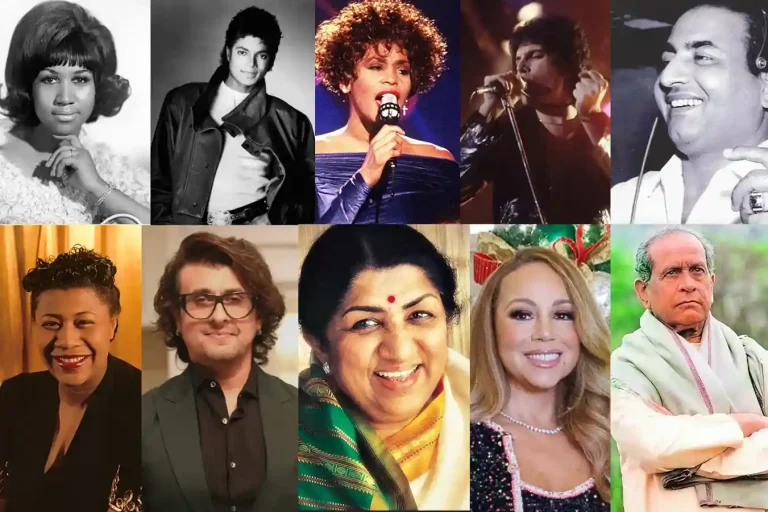All Topics
- Alchemizing Music Concepts for Students
- Artist Spotlight
- artium gift card
- Artium Maestros
- Artium News
- buying guide
- Carnatic Music
- Devotional Music
- Editorials by Ananth Vaidyanathan
- Film Music
- Guitar
- Hindustani Classical Music
- Indian Classical Music
- Indian Folk Music
- Insights
- Instruments
- Karaoke Singing
- Keyboard
- Kids Music
- maestros
- Music Education
- Music for Kids
- Music Industry
- Music Instruments
- Music Legends
- Music Theory
- Music Therapy
- Piano
- piano guide
- Success Stories
- Tamil Film Music
- Telugu Film Music
- Time Theory
- Tools
- Uncategorized
- Vocal Singing
- Vocals
- western classical music
- western music
- Western vocal music
Alchemizing Music Concepts for Students, Film Music
Rekha: The Ultimate Diva Of Bollywood Select Songs From A Historic Career
Rekha: The Ultimate Diva Of Bollywood Select Songs From A Historic Career

Table of Contents
Rekha is regarded as one of the finest actresses in the history of Indian Cinema. Acting is in her genes. Her father, Gemini Ganesan, was a superstar in Tamil films, and her mother, Pushpavalli, acted in both Telugu and Tamil films.
Even from her earliest Hindi hit Sawan Badhon, Rekha displayed remarkable ease with the camera. She understood the art of understated acting – ‘natural’ acting as it is sometimes called. She always comes across, in all her wide varieties of roles, as if she is just being herself on the screen. That is her special genius. To my mind, among all the great actors and actresses, this aspect remains her unique hallmark.
That is her way of ‘getting into the character’. She just becomes the character with such ease that one doesn’t feel she is ‘acting’. Yet, when one studies her performances in detail, one finds that such subtle nuances cannot come without a keen understanding of the character she is playing.
Debuting in Bollywood in 1970, she proved herself an outstanding actress for a decade, especially with Hrishikesh Mukherji’s Khubsoorat and her National Award-winning, celebrated performance in the iconic milestone of Indian cinema, Umrao Jaan. Then followed a long career as a top heroine, followed by an easy transition into character roles, where she continued to secure very meaty roles.
She is one of the most beloved personalities of the Bollywood fraternity. Her life and her evolution as a person and professional have been captured in a critically acclaimed biography published in 2016, entitled Rekha: The Untold Story, penned by Yasser Usman.
Top 10 Rekha Songs Of Bollywood
Dil cheez kya hai – Umrao Jaan, Asha Bhosle
The role of Umrao Jaan catapulted Rekha into the league of all-time great actresses. Muzaffar Ali’s labour of love has become a milestone in Indian Cinema. Asha Bhosle received her first National Award for Dil Cheez Kya Hai.
There is a very interesting anecdote around the recording of this song, as narrated by Khayyam himself in an interview. Ashaji was the busiest playback singer at that point. But she always gave special credence to those musical projects that challenged her musicality and legendary vocal skills. Khayyam wanted a particular tone for the song. So, he decided that Ashaji should record this song in C, a scale lower than what Ashaji customarily recorded solos.
After days of rehearsals, Ashaji came to the studio, but on hearing the low scale, she almost refused to do the recording, feeling it just would not showcase her voice appropriately. Khayyam said he would get the entire live orchestra to redo the scores for the scale desired by her, but requested that before they do that, Ashaji should please just record a take in C. Ashaji obliged. After the take, Ashaji heard the recording and was moved. She told Khayyam – never have I heard my voice sounding so good! That take was finalized and has become history.
Umrao Jaan in a way paved the way for many more exemplary ghazal projects that Ashaji did – Meraj-e-ghazal with Ghulam Ali, and Aabshar-e-ghazal with Hariharan being significant ones. She proved herself to be an outstanding exponent of complex ghazal styles. Of course, she was already a past master in complex Marathi compositions of Hridaynath Mangeshkar, Sudhir Phadke and Srinivas Khale.
Piya bawari – Khubsoorat, Asha Bhosle
Another of Rekha’s milestones. She won her first Filmfare award for this film, directed by the master Hrishikesh Mukherji. In this film Rekha proved that she is rated amongst the finest actresses in Indian cinema. She had become a heroine at the age of 18. So, by the time of Khubsoorat, when she was just 26, she had matured into an actress with histrionic depth.
Piya Bawari, composed by Rahul Dev Burman, gave Asha Bhosle one of her many opportunities to showcase the authentic classical ‘andaz’ in her voice. She is one playback singer who is able to sing classical numbers like an Ustad, such is the depth of her tone and the authenticity in her gamak taans.
This is actually a dance number in the film, and with the tabla accompaniment, Ashok Kumar’s bol padhant is one of the highlights in the song.
Every female film singer and reality show aspirant aspires to crack this celebrated song.
Aaj to paanv zameen par – Ghar, Lata Mangeshkar
Rekha received her first Filmfare nomination for Best Actress for this film in 1979. The same year she was also nominated for Best Supporting Actress for her performance in Muqaddar Ka Sikander.
Playing the role of a young married rape victim, Rekha brought the trauma of the character searing on the screen.
The goriness of the rape is made starker by the writer, the respected theatre personality and film actor Dinesh Thakur and the director, Manik Chatterji, by contrasting it with the initial part of the film which portrays the joy of the young couple settling down into their married life with love. The song, composed by Rahul Dev Burman and rendered by Lata Mangeshkar, brims with the soft joy of a young wife bubbling with love.
Rahul Dev Burman knew which song would suit Lataji and which would suit Ashaji. He had such a contrasting style of composing for both sisters.
Ek tu hai piya jispe dil aa Gaya – Pran Jaaye par Vachan na Jaaye, Asha Bhosle
This film, in which Rekha was the heroine, was very unfortunately the last musical collaboration between Asha Bhosle and O P Nayyar. Together they gave the world of music a style of composition and a style of singing that will remain one of the finest in Indian Music. Their body of work is a subject worthy of study.
O P Nayyar composed six solos for this film, all six sung by Asha Bhosle. The only song that was not featured in the film became the most celebrated finally – Chain se humko kabhi aapne jeene na diya. Asha Bhosle received the Filmfare award for this song.
My other two favourites are Haan ke Dard Jawan Hai, which is picturized on Bindu, and Ek tu hai Piya Jis pe Dil Aa Gaya, picturized on Rekha. Apart from the beauty of Rekha’s dance, the song is an example of the special vocal style that was created by the Asha – O P combination.
Salaam e ishq meri jaan – Muqaddar ka Sikander, Lata Mangeshkar, Kishor Kumar
A compilation of songs filmed on Rekha cannot be complete without this iconic mujra number from the megahit film Muqaddar ka Sikander, where Rekha had a very powerful role and was nominated for Best Supporting Actress.
This is an iconic duet sung by Lata Mangeshkar and Kishor Kumar. The music is by Kalyanji Anandji and the lyrics are by Prakash Mehra himself – the producer and director of the film.
The film was the highest grosser in 1978 and the third highest grossing film of the 70’s ranking behind only Sholay and Bobby!
Neela Aasmaan – Silsila, Lata Mangeshkar
An incredibly beautiful song that has not been celebrated as much as it should have. This Yash Chopra production was a much-hyped film, starring Jaya Bachchan and Rekha with Amitabh Bachchan and Sanjeev Kumar in a tale of doomed wedlock where lovers are separated by fate and forced to marry others. As Amitabh is taking the seven pheras, Rekha is lamenting her loss. But more than the situation, it is the quality of the composition by Shiv Hari in their maiden venture, and the singing by Lataji that is beyond memorable. Who would have thought that a typical mukhkda of the Raga Pahadi can be made to work for such an intensely sad song. Lataji’s handling of the stretched-out contours of this song is stupendous. This composition was a new style created by the two classical maestros.
The antara is truly haunting. That is what makes this a memorable song. Shiv Kumar Sharma always used to say – in many songs, the mukhda is very catchy and good, but the antaras are indifferent. It is important to work on the effectiveness of the antaras.
The lyrics are by Javed Akhtar.
Kaisi paheli zindagani – Parineeta, Sunidhi Chauhan
Rekha has never ceased to surprise us with what she is capable of doing, and how and where she can unexpectedly push the envelope in an unthinkable direction. Parineeta was Vidya Balan’s debut movie, with Shantanu Moitra as music director.
Rekha was 50 when this song was shot. By that age, she had matured into one of the finest actresses of Indian cinema. The manner in which she has captured the mood of the song, the nuances of Sunidhi Chauhan’s voice, modulations and style, the way she has understood and interpreted the choreography, makes this song experience absolutely mesmerizing on screen. She exudes confidence and sensuality with a strange mixture of welcoming warmth.
Shantanu Moitra shot to fame as a music director with this film. This mukhda of this song, composed and arranged in Jazz style, is taken from the song A Kiss to Build a Dream on, sung by the Jazz and Blues legend, Louis Armstrong. Sunidhi Chauhan, a master at adapting to international styles, has done herself and Indian film music proud in this song, as she did with so many when she ruled as the Numero Uno female playback singer.
The scene is composed as a fusion of cabaret dance and cabaret singing. The elegant dance choreography is also a mix of Jazz, Broadway and Bollywood. Some call it Bolly-Jazz. Rekha dances in a maroon saree, and that makes it all the more captivating. Every detail of her costume and hairdo brings out the Euro-Indian fusion culture that held sway in Calcutta at a time.
A veritable treat to hear and watch. The lyrics are by Swanand Kirkire.
Khali Haath Shaam Aayi Hai – Ijaazat, Asha Bhosle
Gulzar, Rahul Dev Burman and Asha Bhosle came together for many iconic projects, including the celebrated non-film project Dil Padosi Hai. Ijaazat was a Gulzar film where Rekha again had a role of a lifetime. Among the various facets of artistry that Rekha mastered was the power of understated acting.
The film has four outstanding songs rendered by Ashaji. Mera Kuch Saaman of course won her second National Award. Apart from Chhoti Si Kahani, the film has two other beautiful songs. The ravishing Katra Katra is of course one of them. But I have chosen the fourth song for this compilation – Khali Haath Aayi Hai, Khali Haath Jayegi.
The industry was very clear about the contrasting strengths of Lata Mangeshkar and Asha Bhosle. Lataji was Soul and Ashaji was Body. Lataji got all the memorable melancholic numbers and Ashaji got all the numbers which required energy, chutzpah. But Asha Bhosle was acknowledged by even Lataji for her stylistic range. In this song, Ashaji expresses the anguish of the tormented wife – the woman who finds herself married to a man still in love with his girlfriend who was never willing to commit to marriage. This is one of Ashaji’s most incredible musical expressions of heartbreak.
Kaahe manwa naache – Alaap, Lata Mangeshkar
It is credit to Rekha’s talent that the great Hrishikesh Mukherjee gave her a sensitive role in his film Alaap in 1977. Those were still the days of dramatic, theatrical histrionics. Even at that stage, Rekha had an innate maturity to be understated in her performances.
The music for this musical was by the great Jaidev, and this song is a raga-based number rendered by Lata Mangeshkar, with lyrics by Rahi Masoom Raza.
Mera man ghabraaye – Saawan Bhaadon, Asha Bhosle
Rekha was just 16 when this film was released in 1970. Yet she comes onto the screen with the ease of a seasoned actress. Rendered superbly by Asha Bhosle, this song is a composition of the music director duo Sonik Omi. The lyrics are by Verma Mallik.






